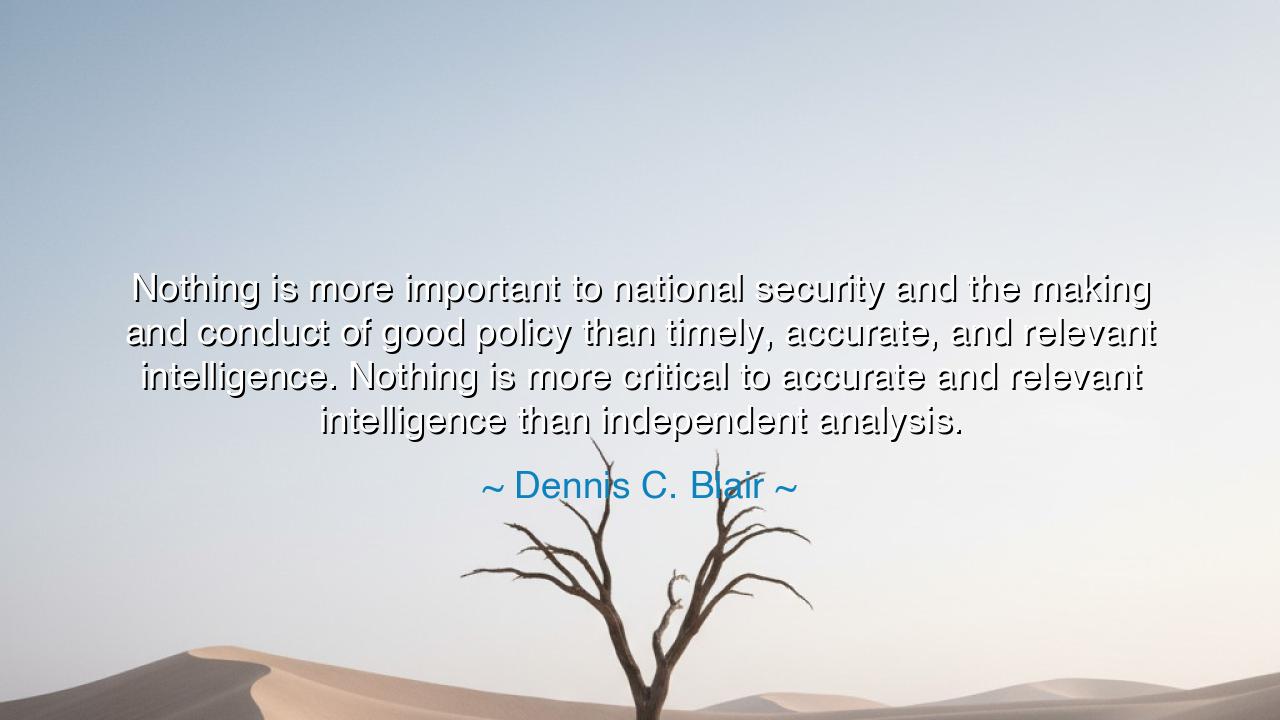
Nothing is more important to national security and the making and
Nothing is more important to national security and the making and conduct of good policy than timely, accurate, and relevant intelligence. Nothing is more critical to accurate and relevant intelligence than independent analysis.






In this grave and luminous declaration, Dennis C. Blair, a former Director of National Intelligence and servant of statecraft, speaks a truth forged in the crucible of history: “Nothing is more important to national security and the making and conduct of good policy than timely, accurate, and relevant intelligence. Nothing is more critical to accurate and relevant intelligence than independent analysis.” These words ring like iron upon an anvil, for they strike at the foundation of power itself — the bond between truth and governance, between the clarity of knowledge and the safety of nations. Blair reminds us that no army, no arsenal, no fortress can protect a people if their leaders walk in darkness, blinded by falsehood or pride. The shield of a nation is not its weaponry, but its wisdom.
The origin of this quote comes from Blair’s deep experience within the corridors of intelligence and command. Having spent decades in the U.S. Navy and later leading America’s intelligence community, he saw firsthand how decisions of monumental consequence depend not on emotion or ideology, but on knowledge that is both honest and untainted. His words were not born in theory, but in the sobering reality of national security — where a single misunderstanding, a misread motive, or a silenced truth can unleash catastrophe. In his call for independent analysis, Blair warns of an ancient danger: when truth becomes the servant of power, power itself collapses.
To speak of intelligence in Blair’s sense is not to speak of espionage or secrecy alone, but of insight — the disciplined pursuit of understanding in a world clouded by deception. For intelligence, to be of value, must be timely — delivered before the moment passes; accurate — grounded in evidence, not wish; and relevant — connected to the real choices before those in command. Yet none of these virtues can exist without independence. The mind that fears to speak truth to power, the analyst who bends fact to please authority, becomes not a guardian of safety, but its betrayer. As the ancients said, “When the wise grow silent, the city falls.”
History offers many reminders of this principle. In the dark months before Pearl Harbor, American analysts possessed fragments of information — warnings, signals, broken codes — yet these were dismissed or misunderstood by leaders whose vision was dulled by assumption. The intelligence was there, but not heard. And again, in more recent times, the tragedy of the Iraq War revealed the peril of analysis distorted by political pressure. Intelligence that should have been independent became entangled with ambition and fear, leading to a conflict built upon illusion. In both cases, lives were lost, trust was broken, and nations learned too late that the price of ignoring honest intelligence is always paid in human blood.
Blair’s words carry not only a warning for governments, but a lesson for all who seek truth. For every person, in their own sphere, must practice the art of independent thought. To think freely, to question boldly, to refuse the comfort of conformity — these are acts of quiet heroism. Whether in the halls of power or in the intimacy of conscience, independence of mind is the first duty of integrity. The wise ruler and the humble citizen alike must remember: truth does not serve us; we must serve truth.
To the leaders of nations, Blair’s message is both command and counsel. Let the analyst be fearless, the advisor be honest, and the leader be humble enough to listen. For intelligence that is filtered through vanity or ideology becomes not a light, but a mirror reflecting only what power wishes to see. True wisdom requires that the seeker of knowledge stand apart from the tides of influence, anchored only by fact and reason. In such independence lies the salvation of nations, and indeed, the dignity of humanity itself.
So, my child, learn from this ancient principle clothed in modern form: seek truth not for comfort, but for clarity. In your work, your leadership, and your life, value not flattery but fact. When you are faced with choice, let your mind be free of bias, and let your speech be bound to honesty. The strength of a nation, like the strength of a soul, depends upon this — the courage to see things as they are, not as we wish them to be.
For in the end, as Dennis C. Blair teaches, intelligence divorced from independence is blindness, and policy divorced from truth is ruin. Whether you guide a nation or a single life, remember: it is not the loudest voice, nor the most confident, that secures the future — but the one that dares to see with open eyes, to speak with clear mind, and to act in fidelity to truth. Only then can wisdom guard the gates of peace.






AAdministratorAdministrator
Welcome, honored guests. Please leave a comment, we will respond soon